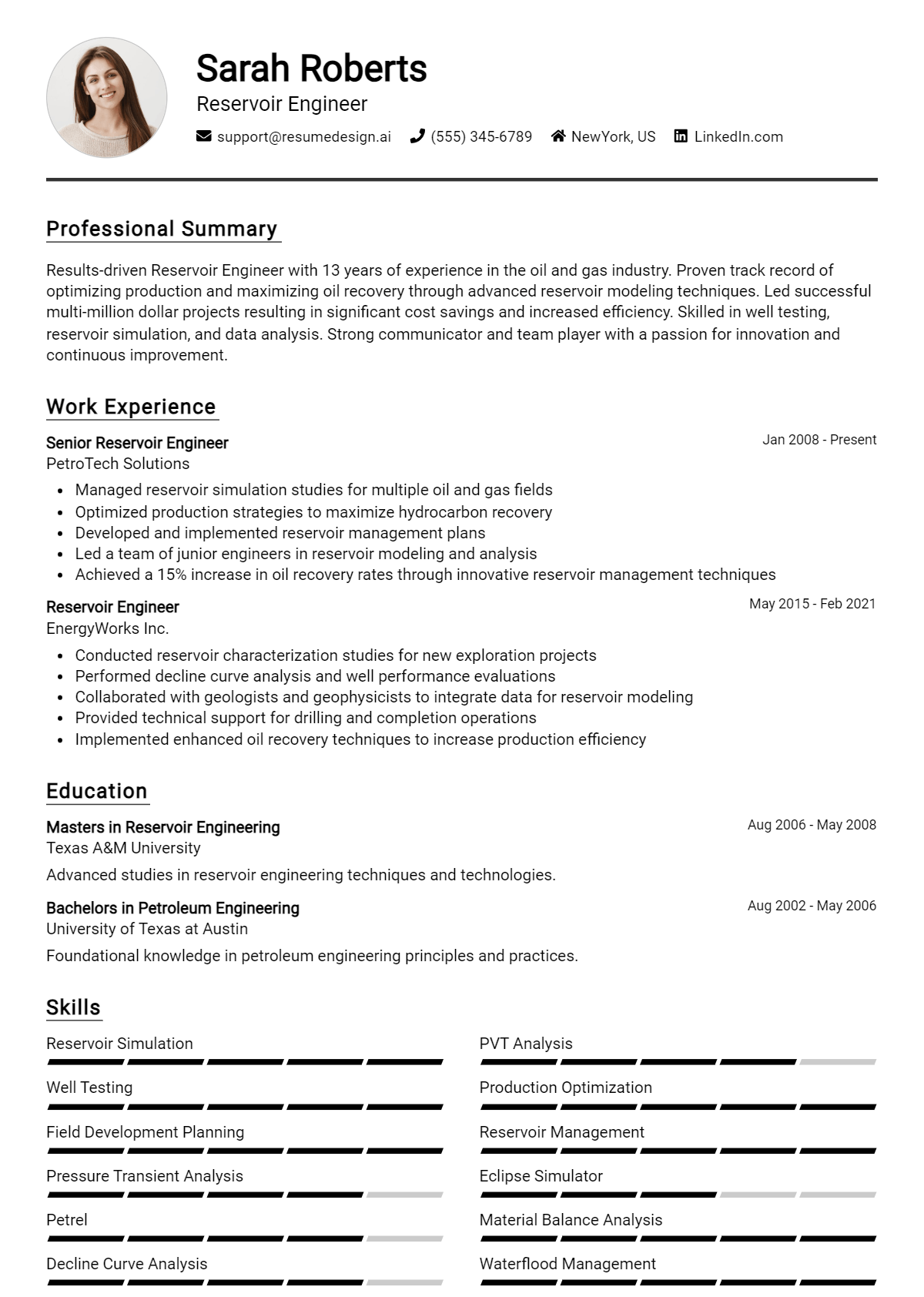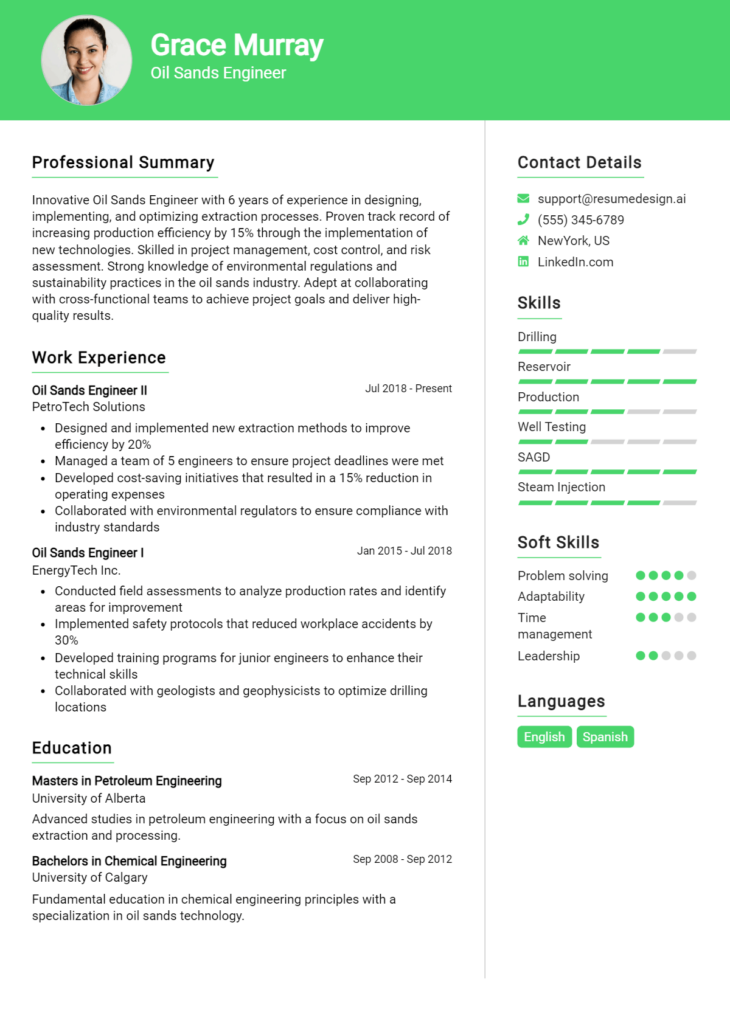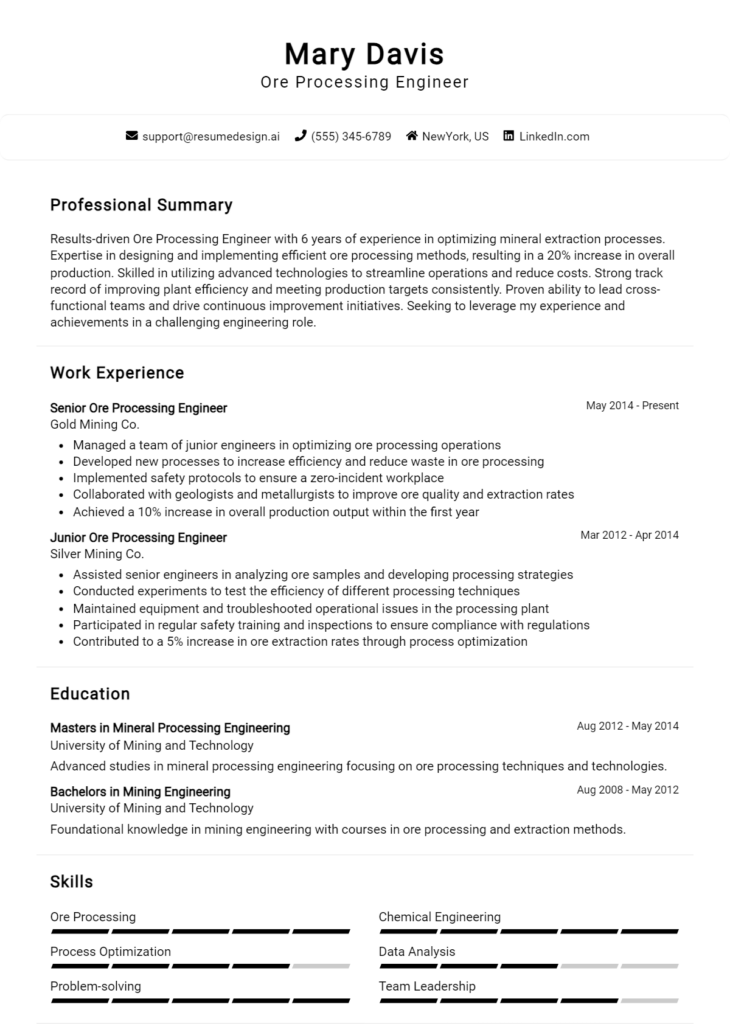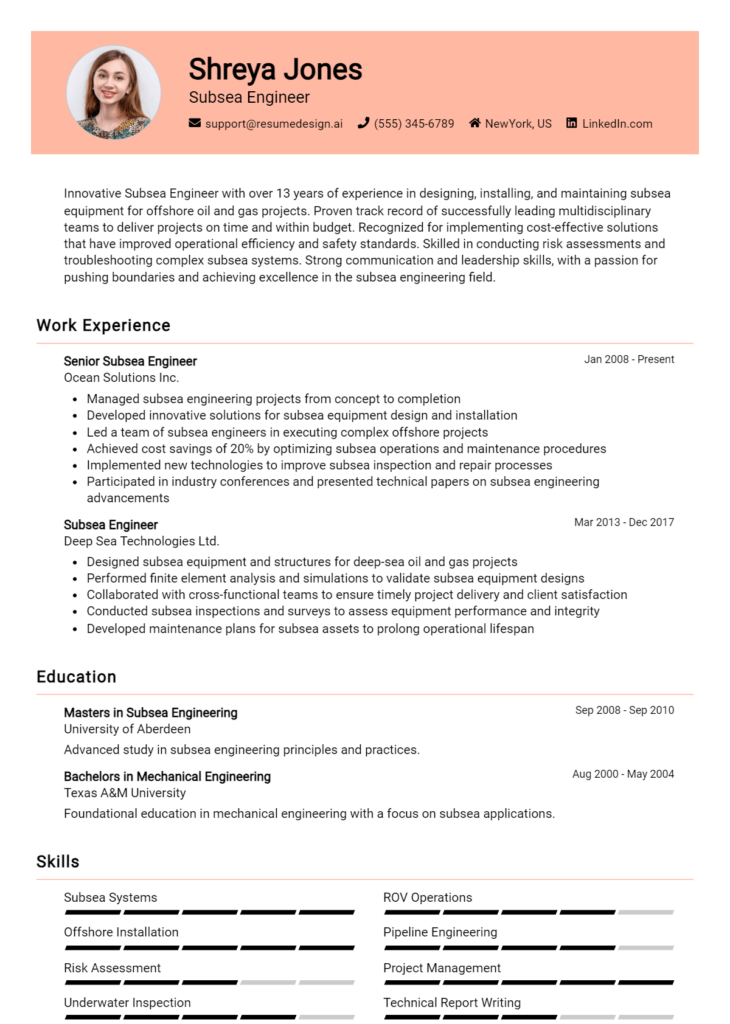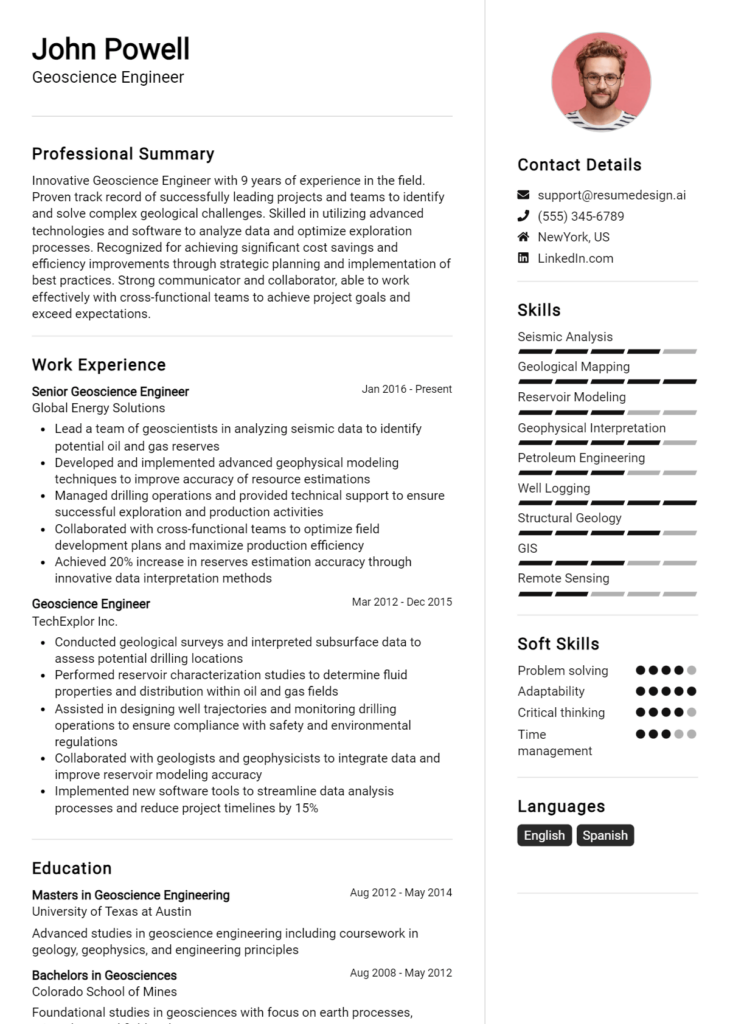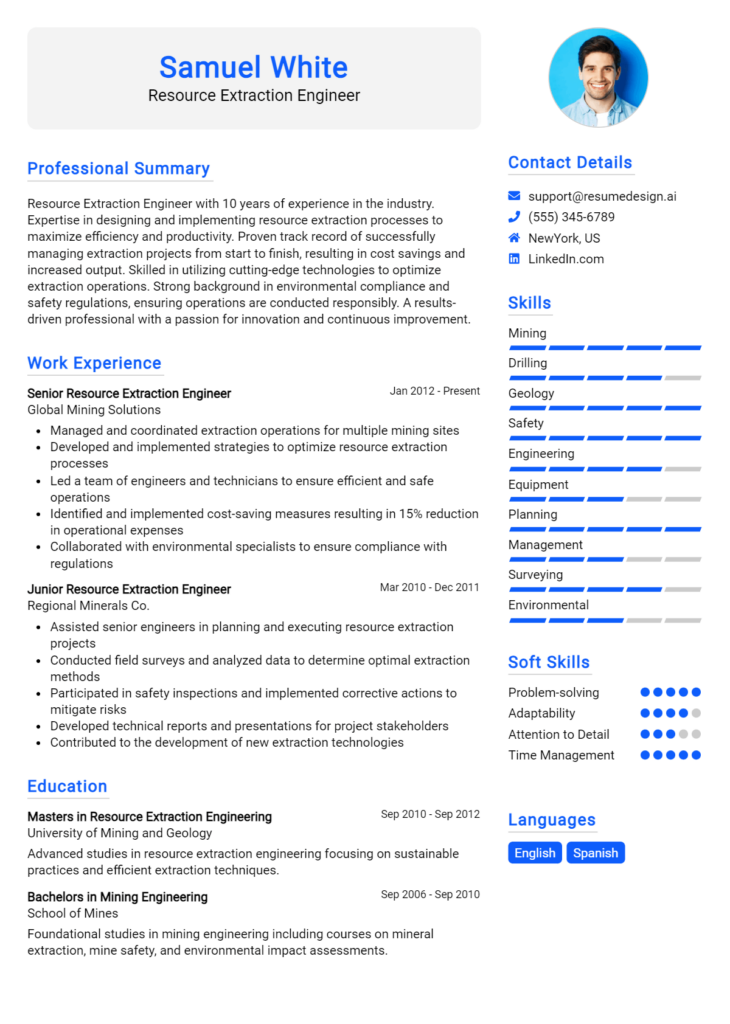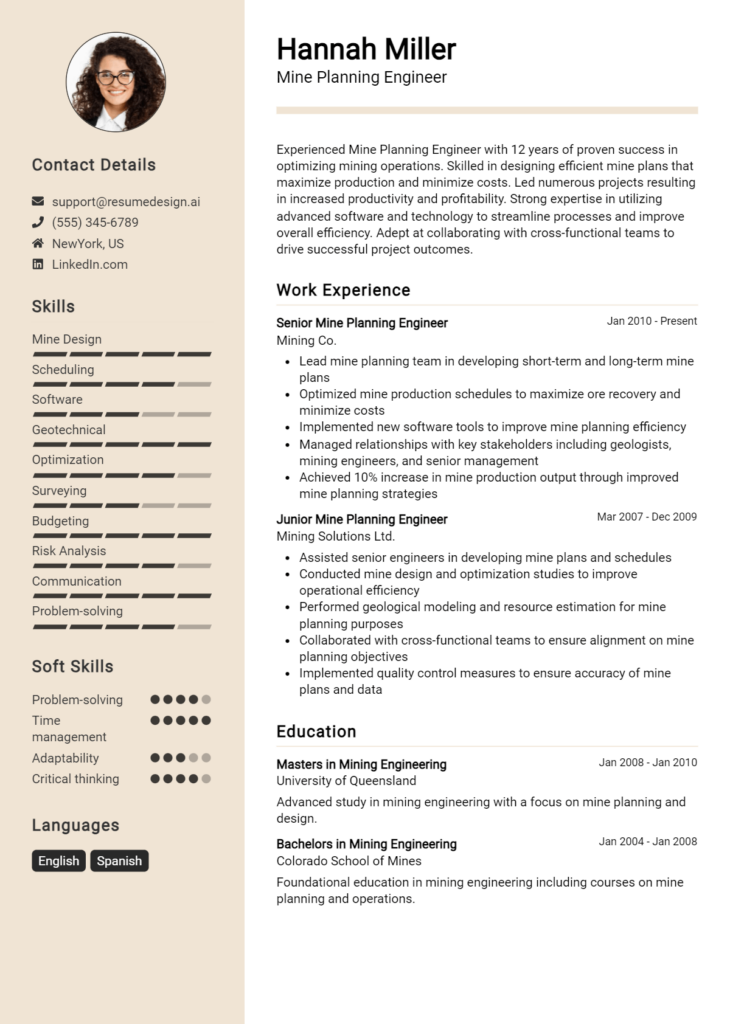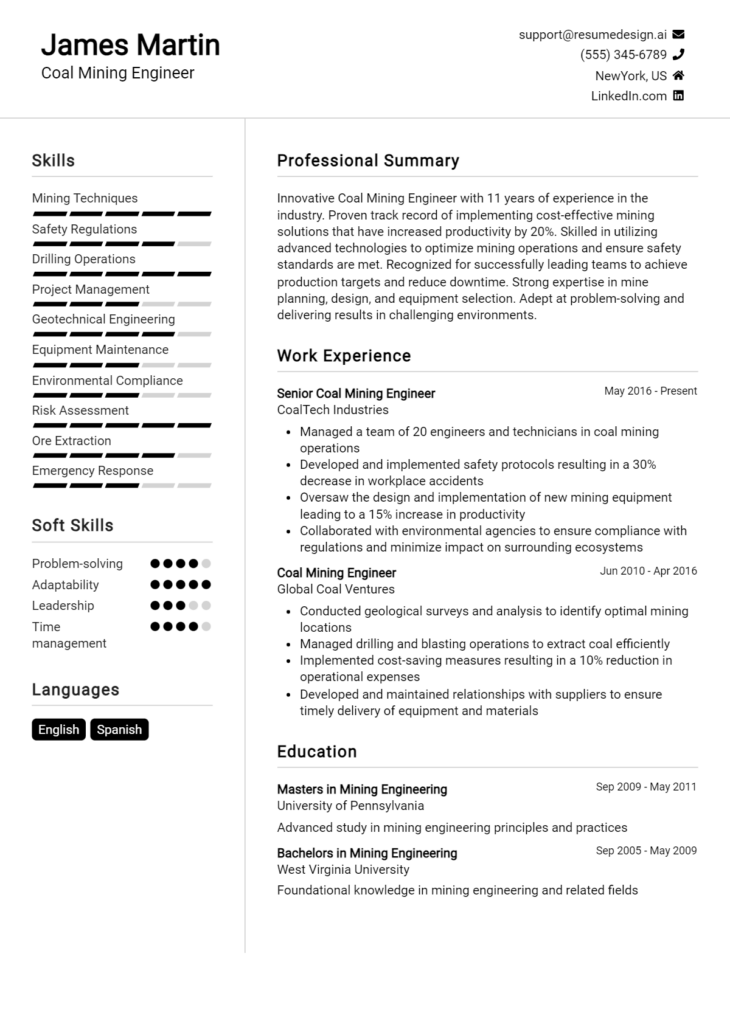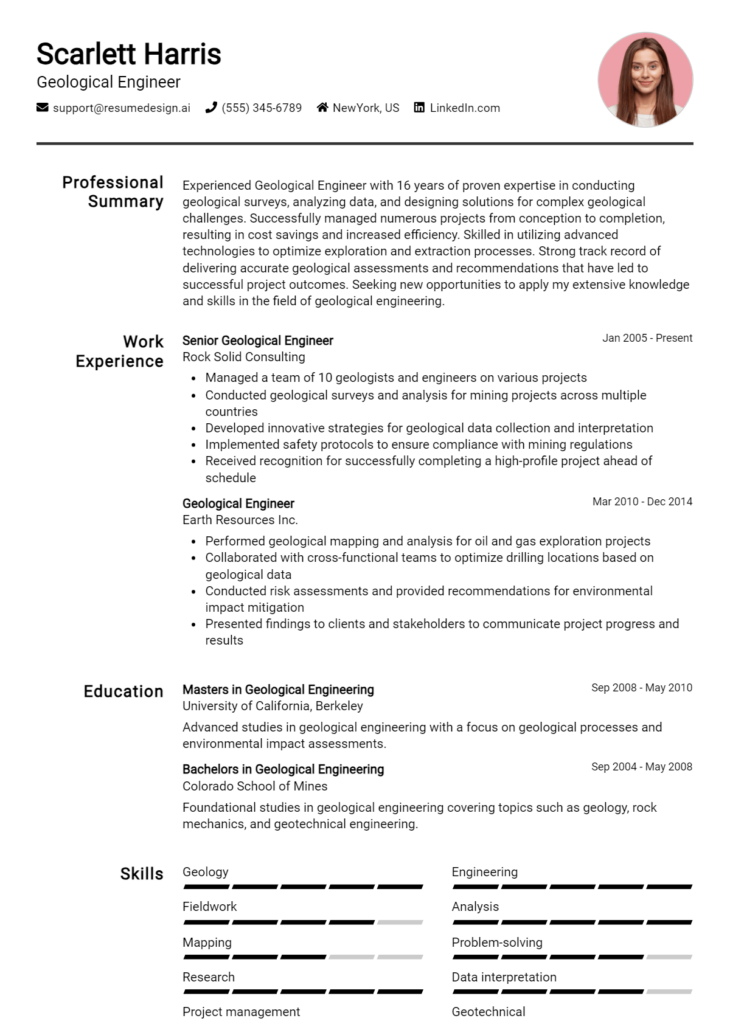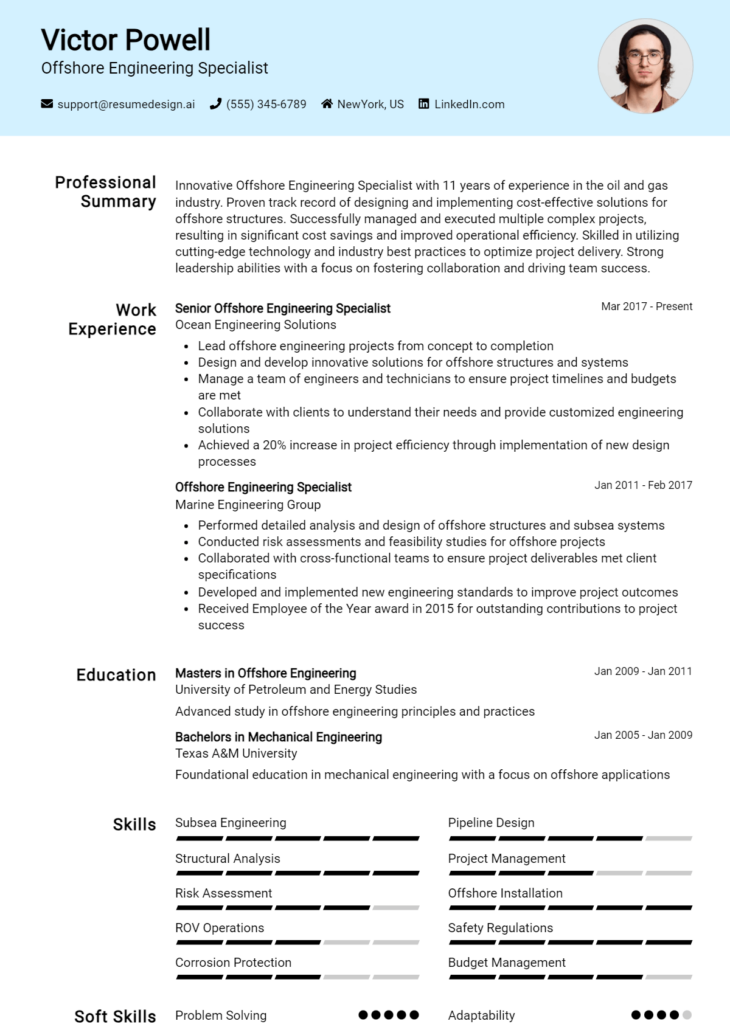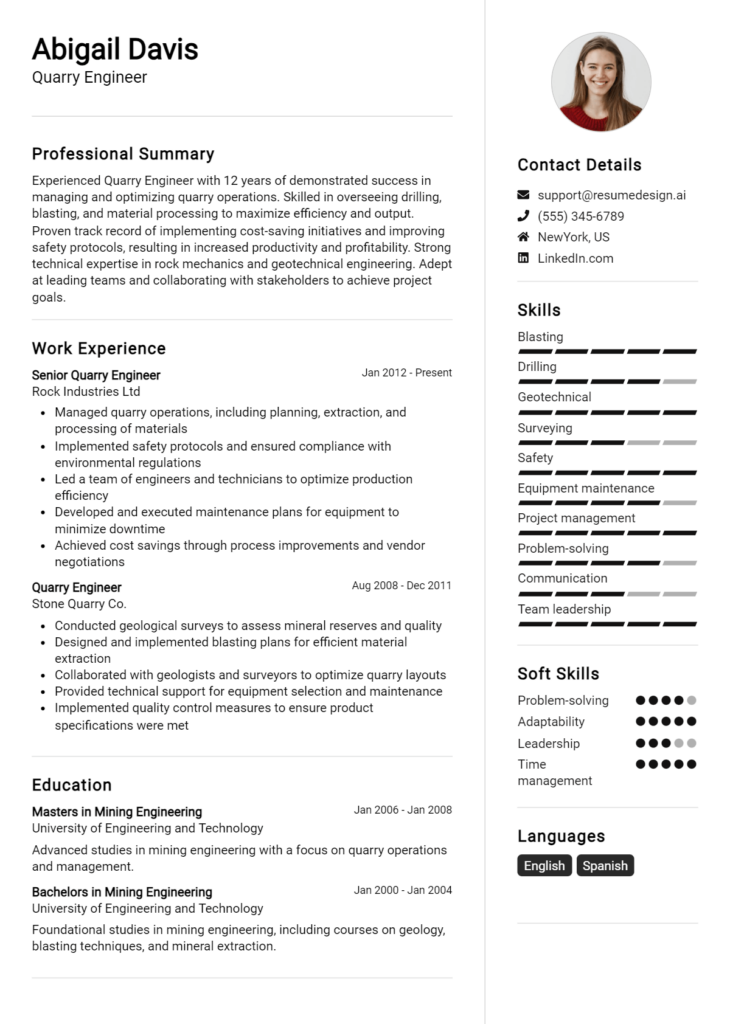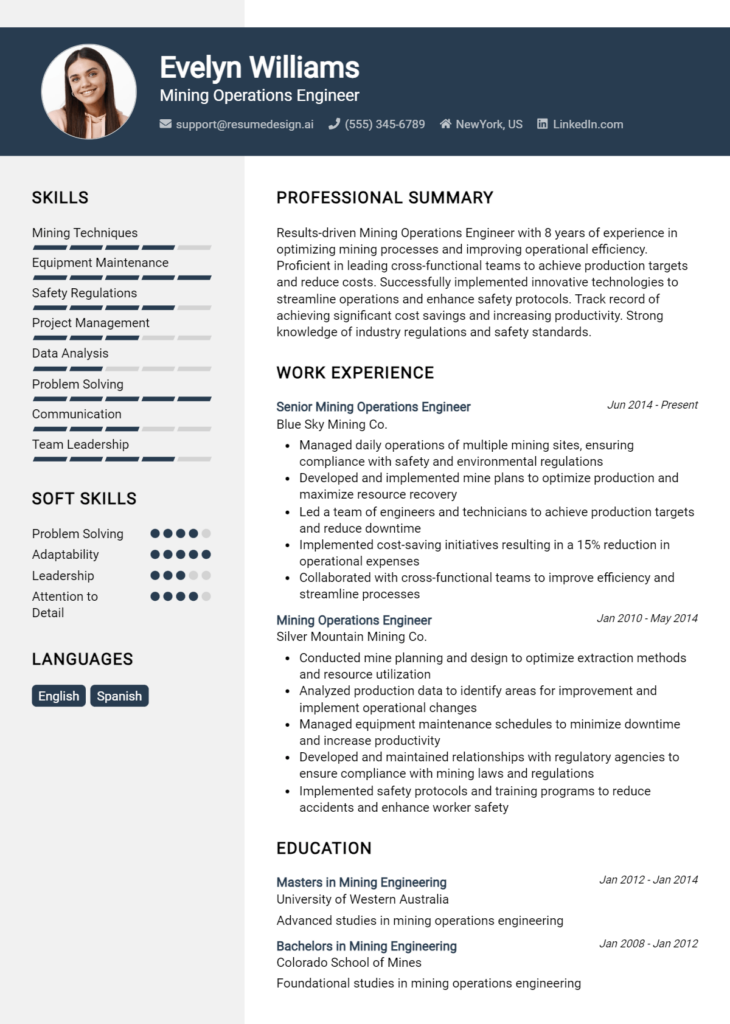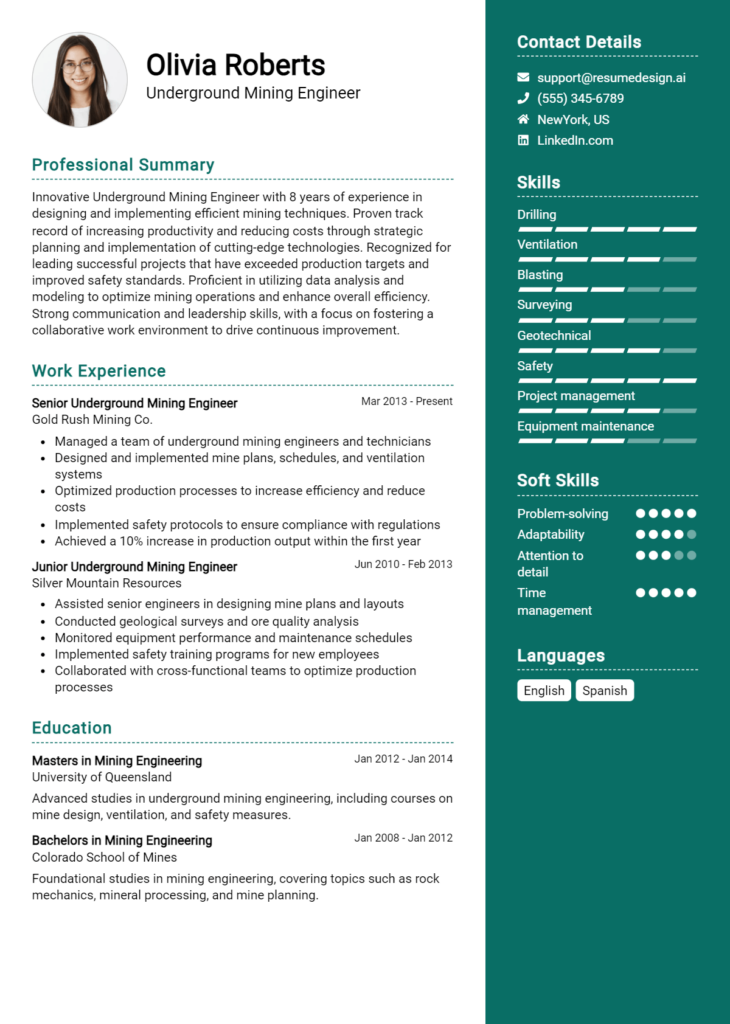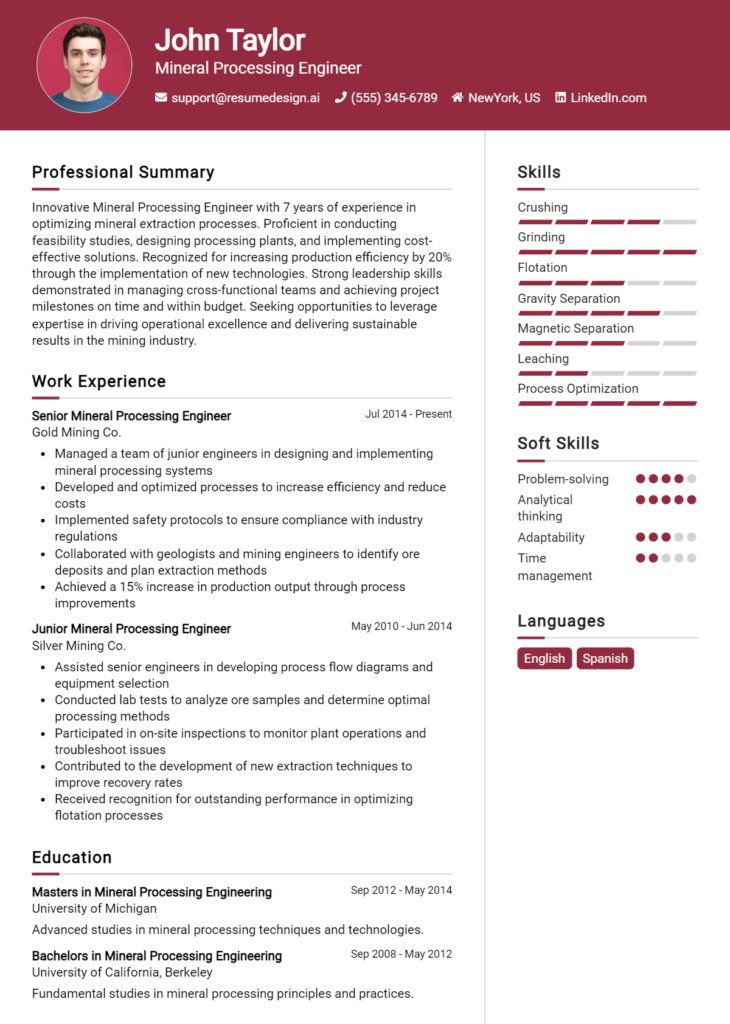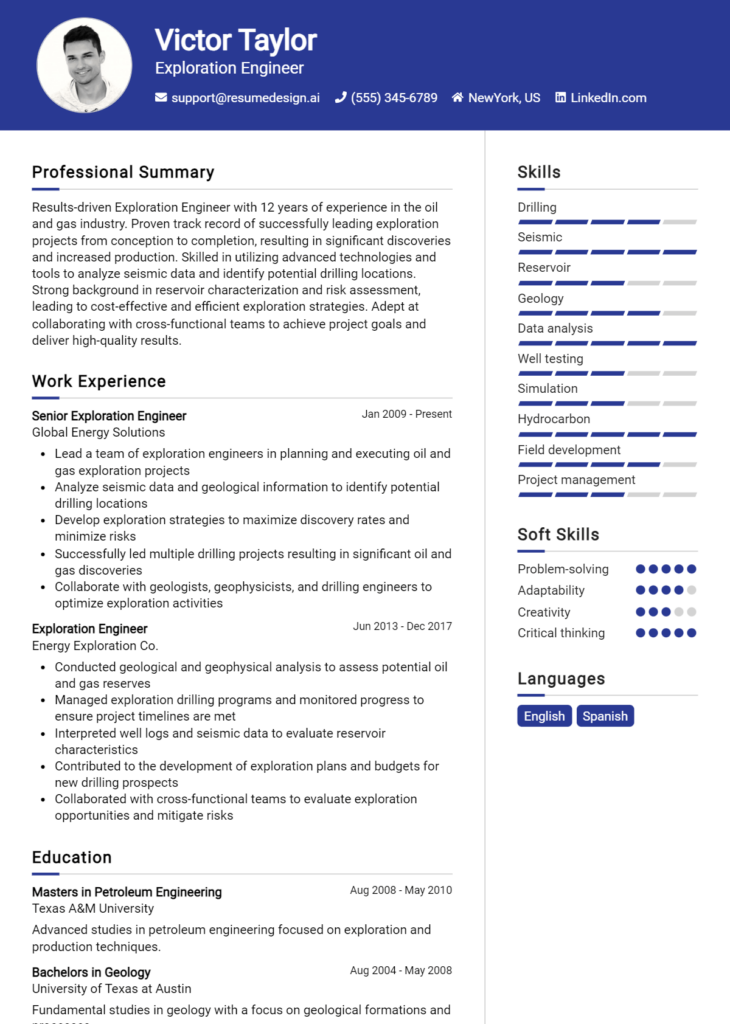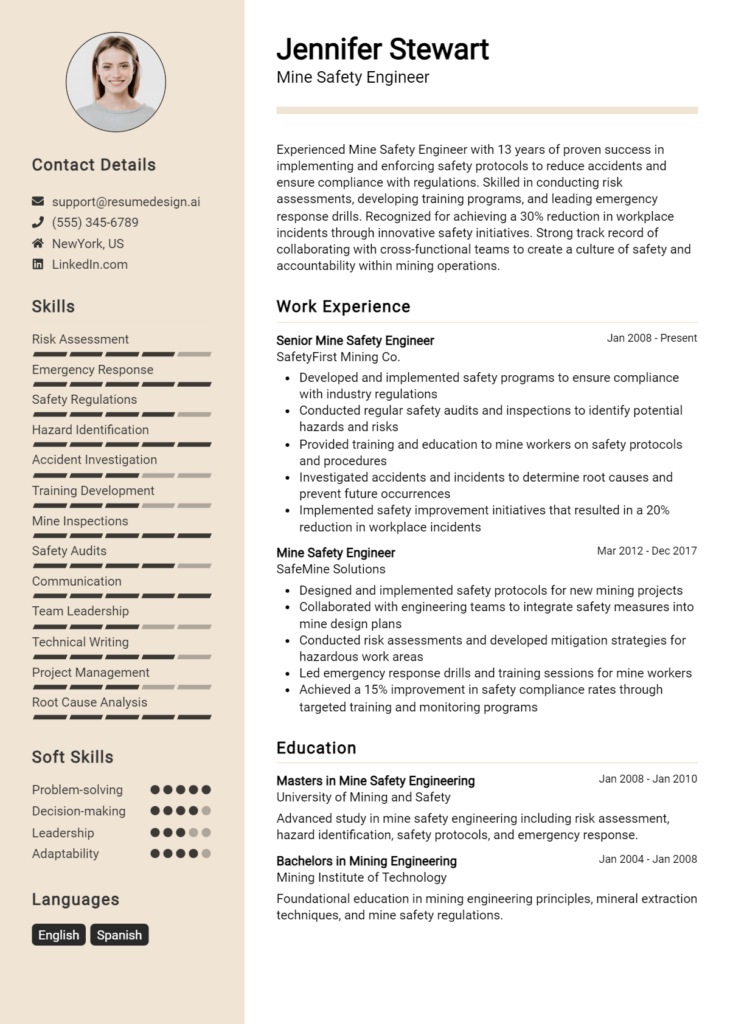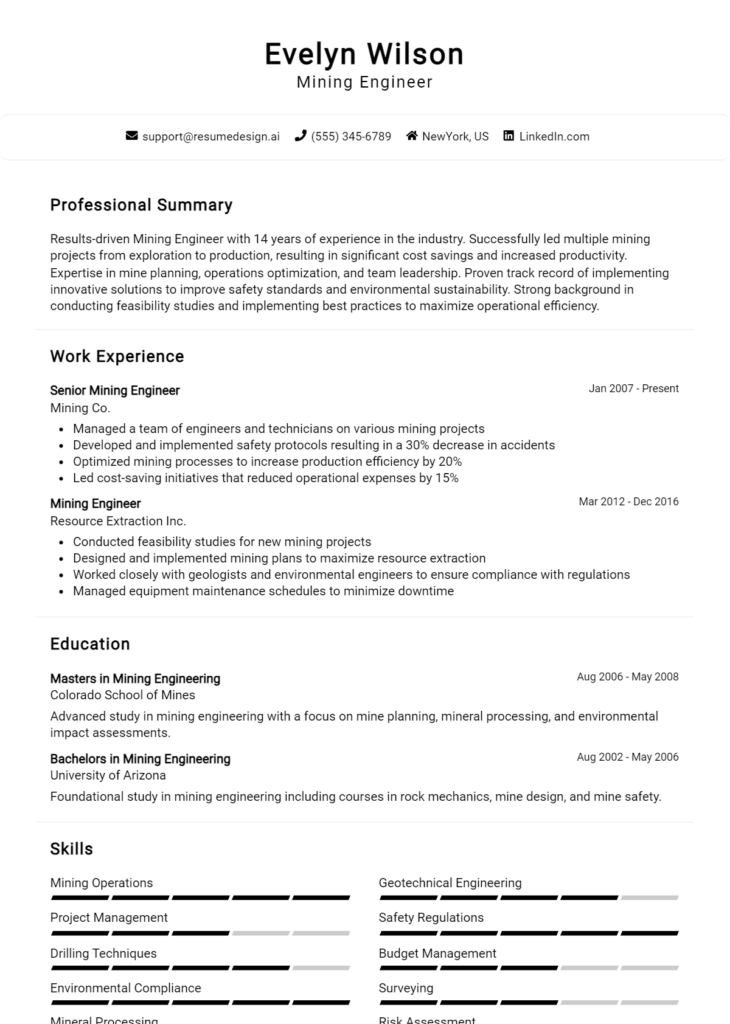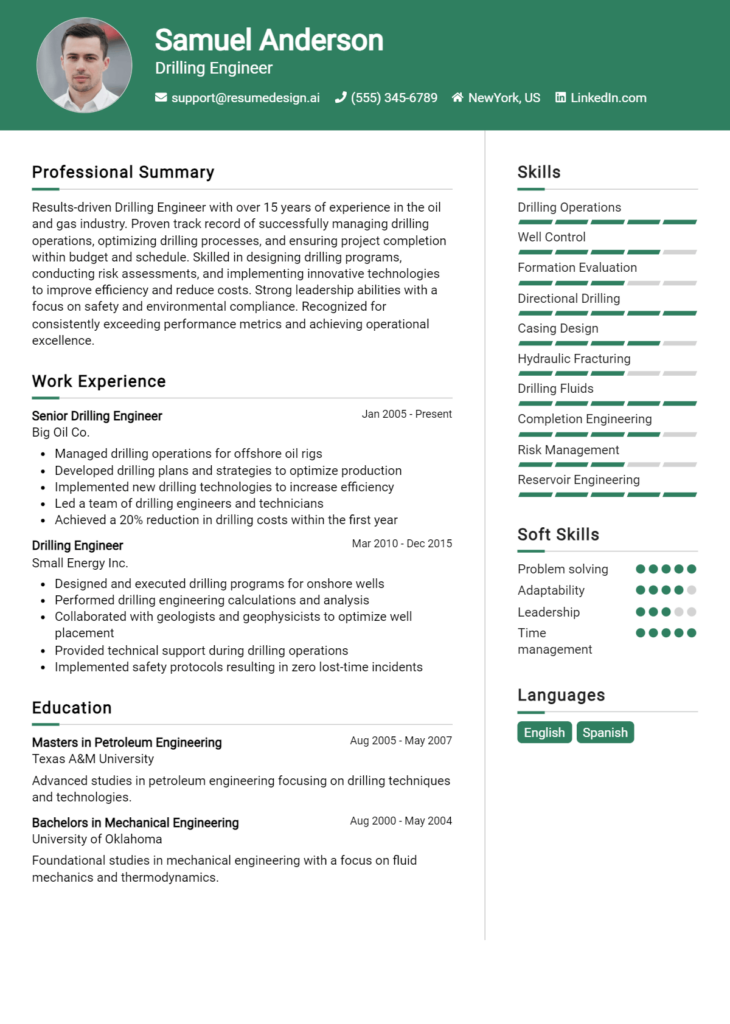Reservoir Engineer Core Responsibilities
Reservoir Engineers play a crucial role in the oil and gas industry, focusing on optimizing hydrocarbon recovery from subsurface reservoirs. Their core responsibilities include conducting reservoir simulations, analyzing production data, and collaborating with geologists and production engineers to enhance extraction methods. Strong technical skills, operational expertise, and advanced problem-solving abilities are essential for success in this role. A well-crafted resume showcasing these competencies can significantly contribute to achieving the organization’s overall goals by demonstrating the engineer’s value across multiple functions.
Common Responsibilities Listed on Reservoir Engineer Resume
- Conduct reservoir performance analysis and forecasting.
- Develop and implement reservoir management strategies.
- Collaborate with geoscientists to evaluate reservoir characteristics.
- Utilize simulation software for reservoir modeling.
- Analyze production data to identify improvement opportunities.
- Design and execute field studies and experiments.
- Participate in well planning and drilling operations.
- Prepare technical reports and presentations for stakeholders.
- Monitor and optimize recovery techniques.
- Assess economic viability of reservoir development projects.
- Ensure compliance with safety and environmental regulations.
High-Level Resume Tips for Reservoir Engineer Professionals
A well-crafted resume is essential for Reservoir Engineer professionals aiming to make a strong first impression on potential employers. In a competitive field where technical expertise and industry knowledge are paramount, your resume serves as your personal marketing tool, reflecting not only your skills but also your significant achievements. A targeted and polished resume can differentiate you from other candidates, showcasing your unique qualifications to hiring managers. This guide will provide practical and actionable resume tips specifically tailored for Reservoir Engineer professionals, helping you to present your experience and capabilities effectively.
Top Resume Tips for Reservoir Engineer Professionals
- Tailor your resume to the job description: Carefully read the job posting and adjust your resume to highlight the skills and experiences that align with the role.
- Showcase relevant experience: Emphasize your work in reservoir engineering, focusing on projects and roles that are most relevant to the position you're applying for.
- Quantify your achievements: Use specific numbers and metrics to illustrate the impact of your work, such as increased production rates or cost savings.
- Highlight industry-specific skills: Include technical skills that are essential for reservoir engineering, such as reservoir simulation software, geological modeling, and data analysis tools.
- Include certifications and professional development: List any relevant certifications (such as PE or SPE) and training that demonstrate your commitment to your professional growth.
- Use clear and concise language: Avoid jargon and overly complex sentences; clarity is key in communicating your qualifications.
- Incorporate keywords: Use industry-related keywords from the job description to ensure your resume passes through applicant tracking systems.
- Maintain a professional format: Use a clean, organized layout that improves readability and draws attention to important information.
- Highlight teamwork and collaboration: Reservoir engineering often involves working with multidisciplinary teams; demonstrate your ability to collaborate effectively.
- Proofread for errors: Ensure that your resume is free from spelling and grammatical mistakes, as these can undermine your professionalism.
By implementing these tips, you can significantly increase your chances of standing out in the competitive field of Reservoir Engineering. A well-optimized resume not only showcases your qualifications but also effectively communicates your value proposition to potential employers, ultimately enhancing your prospects of landing your desired job.
Why Resume Headlines & Titles are Important for Reservoir Engineer
In the competitive field of reservoir engineering, a well-crafted resume headline or title serves as a crucial first impression that can set the tone for the entire application. A strong headline immediately captures the attention of hiring managers, succinctly summarizing a candidate's key qualifications and enticing them to read further. For reservoir engineers, who are tasked with optimizing oil and gas reservoir performance, the headline should be concise, relevant, and directly related to the specific job being applied for, ensuring that it reflects the candidate's expertise and unique value proposition in this specialized field.
Best Practices for Crafting Resume Headlines for Reservoir Engineer
- Keep it concise: Aim for a headline that is no longer than 10-15 words.
- Be specific: Use industry-related terminology and focus on your specialization within reservoir engineering.
- Highlight key skills: Incorporate essential skills that align with the job description.
- Showcase accomplishments: If possible, include quantifiable achievements to demonstrate your impact.
- Use action-oriented language: Start with strong action verbs or adjectives that convey confidence and capability.
- Tailor for each application: Customize your headline to match the specific position and employer you are applying to.
- Maintain professionalism: Ensure the tone reflects professionalism and aligns with industry expectations.
- Avoid clichés: Steer clear of overused phrases that may dilute the uniqueness of your headline.
Example Resume Headlines for Reservoir Engineer
Strong Resume Headlines
Innovative Reservoir Engineer with 10+ Years of Enhancing Oil Recovery Efficiency
Results-Driven Reservoir Engineer Specializing in Enhanced Oil Recovery Techniques
Experienced Reservoir Engineer with Proven Track Record in Asset Optimization
Dynamic Reservoir Engineer with Expertise in Reservoir Simulation and Modeling
Weak Resume Headlines
Engineer Looking for a Job
Reservoir Engineer with Some Experience
Hardworking Professional Seeking Opportunities
The strong headlines are effective because they provide clarity and specificity, immediately communicating the candidate's qualifications and relevance to the position. They incorporate key skills, years of experience, and specific areas of expertise, which resonate with hiring managers looking for candidates who can make an immediate impact. In contrast, the weak headlines fail to impress due to their vagueness and lack of compelling information. They do not convey any unique attributes or significant qualifications, making it difficult for hiring managers to see the value the candidate could bring to their organization.
Writing an Exceptional Reservoir Engineer Resume Summary
A well-crafted resume summary is essential for a Reservoir Engineer as it serves as the first impression a hiring manager will have of the candidate. This brief introduction is crucial for quickly capturing attention by highlighting key skills, relevant experience, and notable accomplishments that align with the job role. An impactful summary should be concise yet powerful, tailored specifically to the job being applied for, ensuring that it resonates with the employer's needs and expectations.
Best Practices for Writing a Reservoir Engineer Resume Summary
- Quantify achievements: Use numbers and statistics to showcase your impact and contributions.
- Focus on relevant skills: Highlight technical expertise and competencies that are essential for reservoir engineering.
- Tailor for the job: Customize your summary to reflect the specific requirements and keywords from the job description.
- Be concise: Keep the summary brief, ideally within 3-5 sentences, to maintain the reader's attention.
- Use action verbs: Start sentences with strong action verbs to convey a sense of proactivity and effectiveness.
- Showcase unique value: Emphasize what sets you apart from other candidates, such as specialized skills or unique experiences.
- Maintain professionalism: Use a professional tone and avoid overly casual language to convey competence.
- Review and edit: Ensure your summary is free from grammatical errors and flows logically.
Example Reservoir Engineer Resume Summaries
Strong Resume Summaries
Dynamic Reservoir Engineer with over 8 years of experience in enhancing reservoir performance, resulting in a 25% increase in production efficiency. Proficient in advanced simulation software and reservoir modeling techniques, leading to optimized resource allocation.
Results-driven Reservoir Engineer with a proven track record of identifying and implementing strategies that improved recovery rates by 15% across multiple fields. Expertise in data analysis and reservoir characterization to drive informed decision-making.
Accomplished Reservoir Engineer specializing in unconventional resources, with experience in managing multi-million dollar projects. Successfully reduced operational costs by 30% through innovative engineering solutions and effective team leadership.
Weak Resume Summaries
Reservoir Engineer with some experience in the field and a variety of skills that may be useful.
Dedicated engineer looking for opportunities to apply my knowledge in reservoir management and related areas.
The examples of strong resume summaries are considered effective because they provide concrete achievements, specific skills, and a clear connection to the role of a Reservoir Engineer. They quantify results, demonstrating the candidate's impact, and are tailored to highlight relevant experiences. In contrast, the weak summaries are vague and lack any quantifiable outcomes or specific details, making them less compelling and memorable to hiring managers.
Work Experience Section for Reservoir Engineer Resume
The work experience section of a Reservoir Engineer resume is critical for showcasing a candidate's technical skills and professional accomplishments. This section not only highlights the engineer's ability to manage teams and collaborate effectively but also demonstrates their capacity to deliver high-quality products that meet industry standards. By quantifying achievements and aligning experiences with established benchmarks in the field, candidates can illustrate their value to potential employers and differentiate themselves in a competitive job market.
Best Practices for Reservoir Engineer Work Experience
- Use specific terminology related to reservoir engineering to demonstrate technical expertise.
- Quantify results wherever possible, such as percentage increases in production or reductions in costs.
- Highlight experience with industry-standard software and technologies relevant to reservoir management.
- Emphasize leadership roles and team management experiences to showcase collaboration skills.
- Include examples of successful projects that align with industry best practices and standards.
- Tailor your experiences to reflect the requirements of the specific job you are applying for.
- Utilize action verbs to convey a sense of initiative and impact in your previous roles.
- Keep descriptions concise but informative, ensuring clarity and relevance to the position.
Example Work Experiences for Reservoir Engineer
Strong Experiences
- Led a cross-functional team of 10 engineers to successfully increase oil recovery by 15% in a mature field through innovative reservoir modeling techniques.
- Implemented Enhanced Oil Recovery (EOR) strategies that resulted in a 20% reduction in operational costs while increasing production rates by 30% within the first year.
- Developed and executed a comprehensive reservoir management plan that improved asset performance, contributing to a $5 million increase in annual revenue.
- Collaborated with geoscientists and production teams to optimize well placement, resulting in a 25% boost in initial production rates across new wells.
Weak Experiences
- Worked on projects related to reservoir engineering.
- Assisted with various tasks in the engineering department.
- Involved in team meetings and discussions about oil production.
- Participated in some reservoir management activities.
The examples provided illustrate the difference between strong and weak experiences in a Reservoir Engineer resume. Strong experiences are characterized by specific, quantifiable outcomes and demonstrate leadership, technical expertise, and collaboration. In contrast, weak experiences are vague and lack measurable results, failing to convey the candidate's true impact or skills in the field. This highlights the importance of crafting compelling, results-oriented descriptions that align with industry expectations.
Education and Certifications Section for Reservoir Engineer Resume
The education and certifications section of a Reservoir Engineer resume is crucial as it showcases the candidate's academic credentials, relevant industry certifications, and commitment to continuous professional development. This section not only reflects the foundational knowledge necessary for the role but also emphasizes the candidate's proactive approach to enhancing their expertise in reservoir engineering. By detailing relevant coursework, certifications, and specialized training, candidates can significantly bolster their credibility and demonstrate alignment with the core competencies required for the job, making them more appealing to potential employers.
Best Practices for Reservoir Engineer Education and Certifications
- List degrees in reverse chronological order, starting with the most recent.
- Include relevant coursework that directly pertains to reservoir engineering, such as fluid mechanics, thermodynamics, and reservoir simulation.
- Highlight industry-recognized certifications, such as the Professional Engineer (PE) license or Society of Petroleum Engineers (SPE) certifications.
- Provide details on specialized training or workshops that demonstrate advanced skills or knowledge in emerging technologies.
- Use clear and concise language to describe educational achievements, avoiding jargon that may not be familiar to all readers.
- Include the name of the institution, degree earned, and graduation date for each entry.
- Showcase any honors or awards received during academic programs to illustrate excellence.
- Regularly update this section to reflect new qualifications or courses undertaken to stay relevant in the field.
Example Education and Certifications for Reservoir Engineer
Strong Examples
- M.S. in Petroleum Engineering, University of Texas at Austin, 2022
- Certified Petroleum Engineer (CPE), Society of Petroleum Engineers, 2023
- Relevant Coursework: Reservoir Simulation, Enhanced Oil Recovery Techniques, and Geomechanics.
- B.S. in Chemical Engineering, University of Alberta, 2020
Weak Examples
- High School Diploma, Springfield High School, 2015
- Certification in Basic Computer Skills, 2020
- B.A. in History, University of XYZ, 2018
- Online Course: Introduction to Cooking, 2021
The examples provided contrast strong and weak qualifications effectively. Strong examples feature relevant degrees and certifications that align with the requirements of a reservoir engineer, demonstrating a solid foundation in the field and ongoing professional development. In contrast, weak examples illustrate educational qualifications that lack relevance to reservoir engineering, such as unrelated degrees and certifications that do not enhance the candidate's suitability for the role. Candidates should aim to include only those credentials that substantively support their expertise in reservoir engineering.
Top Skills & Keywords for Reservoir Engineer Resume
A well-crafted resume is essential for a Reservoir Engineer, as it reflects not only technical expertise but also the soft skills necessary for effective collaboration in complex projects. Highlighting the right skills can significantly enhance a candidate's appeal to potential employers, showcasing their ability to analyze data, solve problems, and communicate effectively within multidisciplinary teams. By focusing on both hard and soft skills, candidates can present a well-rounded profile that aligns with the demands of the role and the expectations of the industry.
Top Hard & Soft Skills for Reservoir Engineer
Soft Skills
- Communication
- Teamwork
- Problem-solving
- Critical thinking
- Adaptability
- Attention to detail
- Leadership
- Time management
- Negotiation
- Conflict resolution
- Decision-making
- Creativity
- Analytical thinking
- Interpersonal skills
Hard Skills
- Reservoir simulation software (e.g., ECLIPSE, CMG)
- Geology and geophysics knowledge
- Data analysis and interpretation
- Well testing and performance analysis
- Enhanced oil recovery techniques
- Production forecasting
- Reservoir characterization
- Economic analysis and modeling
- Project management
- Technical report writing
- Fluid mechanics
- Thermodynamics
- Natural resource management
- Knowledge of drilling techniques
These skills are crucial for a successful Reservoir Engineer, and when paired with relevant work experience, they create a compelling case for any job application.
Stand Out with a Winning Reservoir Engineer Cover Letter
I am writing to express my interest in the Reservoir Engineer position at [Company Name], as advertised on [where you found the job listing]. With a strong educational background in petroleum engineering and over [X years] of hands-on experience in reservoir management and simulation, I am excited about the opportunity to contribute to your team. My expertise in utilizing advanced reservoir modeling techniques and data analysis aligns perfectly with the innovative projects at [Company Name], and I am eager to bring my skills to help optimize reservoir performance and enhance recovery techniques.
Throughout my career, I have successfully managed various reservoir studies, employing state-of-the-art simulation software to analyze reservoir behavior and forecast production trends. My role at [Previous Company] involved collaborating with multidisciplinary teams to develop and implement enhanced oil recovery strategies, which resulted in a [X%] increase in production over [time period]. I am particularly proud of my ability to communicate complex technical concepts to stakeholders, ensuring that project objectives are met while maintaining alignment with corporate goals. This skill, combined with a strong foundation in both theoretical and practical aspects of reservoir engineering, equips me to make a significant impact on your projects.
I am particularly drawn to [Company Name] because of its commitment to innovation and sustainability in the energy sector. I admire your recent initiatives in [mention any specific projects or values of the company], and I am enthusiastic about the possibility of contributing my skills in reservoir engineering to support these goals. I am confident that my analytical mindset, combined with my passion for optimizing reservoir performance, will enable me to provide valuable insights and drive successful outcomes for your team.
Thank you for considering my application. I look forward to the opportunity to discuss how my experience and vision align with the goals of [Company Name]. I am excited about the possibility of contributing to your team's success and am eager to bring my expertise in reservoir engineering to [Company Name]. Please feel free to contact me at [your phone number] or [your email address] to schedule a conversation.
Common Mistakes to Avoid in a Reservoir Engineer Resume
When crafting a resume for a Reservoir Engineer position, it is crucial to present your skills and experience in a clear and effective manner. However, many candidates often make common mistakes that can hinder their chances of standing out to potential employers. Avoiding these pitfalls can significantly improve the strength of your resume and enhance your opportunity to secure an interview. Here are several common mistakes to watch out for:
Lack of Relevant Keywords: Failing to include industry-specific keywords can lead to your resume being overlooked by Applicant Tracking Systems (ATS) that scan for specific terms related to reservoir engineering.
Overly Generic Objective Statement: Using a vague or generic objective statement does not convey your specific interest in the position or the value you bring. Tailor your objective to reflect your aspirations and how they align with the company's goals.
Ignoring Quantifiable Achievements: Simply listing job duties without quantifying your achievements can make your resume less impactful. Use metrics and specific examples to demonstrate your contributions, such as increased production rates or cost savings.
Inconsistent Formatting: A resume with inconsistent formatting can appear unprofessional and distract from the content. Ensure that fonts, bullet points, and headings are uniform throughout the document for a polished look.
Neglecting to Highlight Technical Skills: Reservoir engineering relies heavily on specific technical skills and software proficiency. Failing to highlight these skills can leave a gap in your qualifications that employers may find concerning.
Excessive Length: Many candidates make the mistake of creating overly lengthy resumes. Aim for a concise, one to two-page document that highlights the most relevant experiences and skills without unnecessary information.
Lack of Tailoring for Each Application: Sending out a generic resume for multiple job applications can lead to missed opportunities. Customize your resume for each position by aligning your experience and skills with the specific job requirements.
Poorly Written Summary or Experience Section: A summary or experience section filled with jargon, unclear language, or grammatical errors can detract from your professionalism. Write clearly and concisely, focusing on your accomplishments and expertise.
Conclusion
As we conclude our discussion on the essential skills and responsibilities of a Reservoir Engineer, it's crucial to recognize the pivotal role you play in optimizing resource extraction and ensuring sustainability in the energy sector. Here are the key points we've covered:
- Technical Expertise: Proficiency in geology, fluid mechanics, and reservoir simulation is vital for effective performance in this role.
- Analytical Skills: The ability to analyze data and interpret complex simulations is essential for making informed decisions regarding reservoir management.
- Collaboration: Working closely with geologists, production engineers, and project managers ensures a cohesive approach to resource development.
- Continuous Learning: Staying updated with the latest technologies and methodologies is crucial in an ever-evolving industry.
With these points in mind, it's time to reflect on your own career as a Reservoir Engineer. Is your resume showcasing your skills and experiences effectively? We encourage you to take action and review your Reservoir Engineer Resume to ensure it highlights your qualifications and achievements.
To assist you in this process, consider utilizing the following resources:
- Explore our resume templates to find a design that suits your professional style.
- Use our resume builder for a user-friendly experience in creating a polished resume.
- Check out resume examples to gain inspiration and see how others in your field present their qualifications.
- Don’t forget to craft a compelling cover letter with our cover letter templates to accompany your resume.
Take the next step in advancing your career by reviewing and refining your resume today!

